Ian Melin-Jones
Sulzer launches new CPE end-suction single-stage centrifugal pump
Sulzer has once again broken the conventions in the name of efficiency. The new CPE ANSI process pumps are specifically designed to exceed the strictest energy regulations for all industries as well as the requirements of ASME B73.1. With revolutionary hydraulics and high efficiency, they offer low life cycle costs.
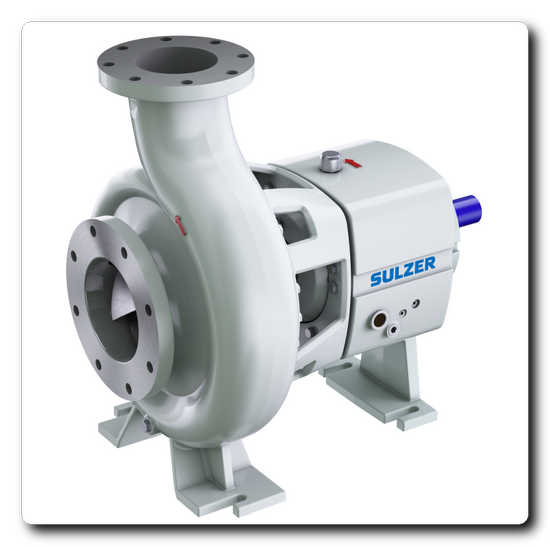
The new CPE pumps meet the process requirements in a variety of industrial applications, and are suitable for use with clean or slightly contaminated liquids, viscous liquids of up to 3’000 cSt, and fibrous slurries with a consistency up to 6%.
When engineering the new range of CPE pumps, we at Sulzer considered numerous factors that can potentially influence the total cost of ownership of a process pump. The result is an innovative design that makes it possible for the user to achieve remarkable annual savings.
We improved the reliability of the CPE pump and reduced the risk for unplanned shutdowns by optimizing the shaft sealing. Heavy-duty rigid bearing units ensure a long bearing life and further protection against unexpected shutdowns. Learn more on sulzer.com.
The new pump design brings higher efficiency that translates into lower energy consumption. Coupled with this, the high standardization, easy installation and robust construction also equate to lower maintenance and operating costs.
“We are eager to offer our new CPE pump range to our customers, because it fits a wide range of industrial applications and will reduce operating costs.”
Joe Salah, Sales Manager, Sulzer Pump Solutions Inc.
Sustainable Water Management: The Heart of Our Pulp and Paper Mills
When people think of paper manufacturing, the first natural resource that comes to mind is probably trees. But water plays an equally important role in our industry. That’s why sustainable water management is one of our top priorities.
The location of our facilities shows how important water is to our manufacturing process. We’ve built our mills near abundant water supplies, such as the shores of rivers, to draw water for our operations. Managing these natural resources is important to us and to the communities in which we live.
Water Use at Domtar
In 2017, our pulp and paper mills used enough water to fill 164,000 Olympic-sized swimming pools. But because of our extensive water recycling loops, we can reuse that water an average of 10 times in the mill before we treat it one final time in our onsite wastewater treatment plants. Of the water we bring into our mills, about 90 percent is returned to its original source. The other 10 percent evaporates or becomes part of our products and byproducts.
The water we do use — 94 percent of which comes from surface-water sources such as lakes and rivers — does a lot of work. It’s used to wash and transport pulp, dilute and prepare process chemicals, generate steam and electricity, carry energy and raw materials throughout the mill, and clean and cool equipment.
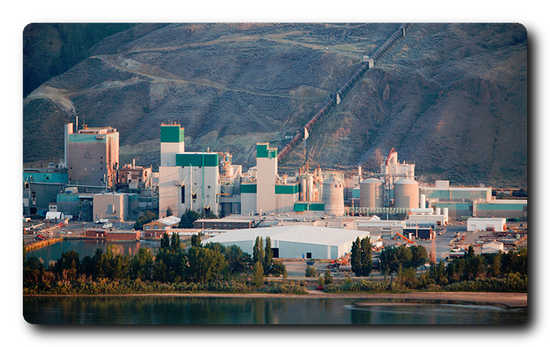
Each of our mills has a unique water footprint. Mill age, the kind of equipment we use and the types of pulp and paper products we produce are the primary drivers of how much water we use.
For example, specialty papers, such as medical paper, require more water to produce than everyday copy paper. That’s because specialty papers are generally manufactured using shorter runs with more grade changes. They also have more stringent quality requirements, such as FDA requirements for food packaging, which can limit opportunities to reuse water.
A Focus on Sustainable Water Management
Some of our mills, first built in the late 1800s, did not include water conservation features in their original design. But as we’ve upgraded them and built new mills, we’ve placed special emphasis on sustainable water management.
We’re doing our part to conserve water. Our mills have reduced total water use by 4 percent since 2013. That means we can now avoid using enough water to fill 6,560 Olympic-sized swimming pools each year.
“Water is a local resource best managed with site-specific strategies,” says Paige Goff, Domtar’s vice president of sustainability. By understanding the unique challenges and opportunities where we operate, we can manage water usage in a way that helps us be better stewards of this shared resource, making our business and communities more sustainable.
As in many other parts of nature, sustainable water management and sustainable forestry work hand in hand. Forests play a critical role in protecting and conserving valuable water resources by recharging ground water supplies, buffering and absorbing storm water surges, and cleaning and protecting the lakes and rivers our mills and local communities depend on. We support the protection of the forested landscapes, forest wetlands and watersheds from which we source forest and water resources.
We also recognize that we literally are connected to our neighbors through the rivers and lakes that supply our water. As we continue to innovate, we are also working to improve water quality and water management so that we can serve as better stewards of these shared resources. Learn more by reading our 2017 Sustainability Report.
Voith Product selector: Customize your roll cover with new software
The NanoSelect calender roll covers are tailored precisely to the specific requirements of a paper machine and as a result increase machine efficiency and paper quality. The desired roll cover properties are determined in consultation between a specialist from the paper manufacturer and the Voith sales engineer. The NanoSelect calender roll covers are configured using the specially developed product selector software.
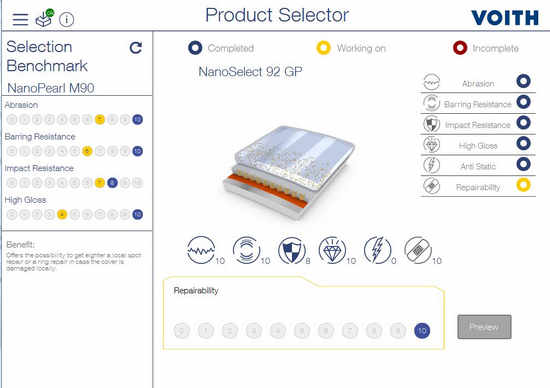 The Voith consultant uses the software to put together the best technology for the roll cover. The result is a mixture of standard and application-specific components.
The Voith consultant uses the software to put together the best technology for the roll cover. The result is a mixture of standard and application-specific components.
Through the product selector and NanoSelect calender roll covers Voith is offering a new and unique way of satisfying individual customer requirements. Because the requirements that a roll cover needs to meet differ from paper machine to paper machine. This is why paper manufacturers often have to make compromises when selecting a cover. The new product selector software now allows paper makers to quickly and easily configure and procure the ideal roll cover for their specific application.
During a consultation with a sales specialist from Voith, the customer prioritizes their most important properties on the basis of parameters like wear or barring resistance. The consultant uses the software to put together the best technology for the roll cover. The result is a mixture of standard and application-specific components. This means that every cover is a one-off and is produced individually for the customer. Voith is grouping these customized roll covers under the new product name NanoSelect.
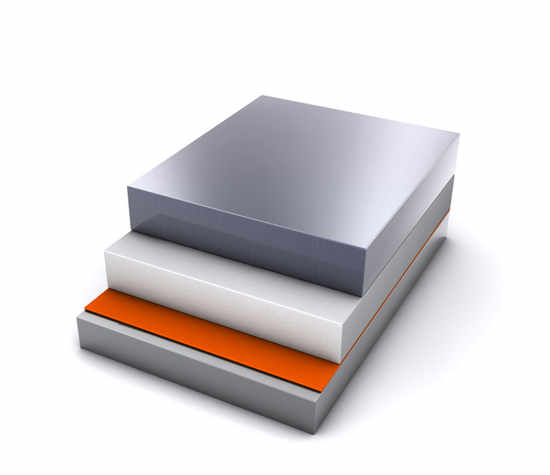 The NanoSelect calender roll covers are tailored precisely to the specific requirements of a paper machine and as a result increase machine efficiency and paper quality.
The NanoSelect calender roll covers are tailored precisely to the specific requirements of a paper machine and as a result increase machine efficiency and paper quality.
As NanoSelect roll covers are ideally matched to the requirements of a specific application, they facilitate the production of paper in the desired quality.
Regardless of the paper manufacturers' individual requirements they can use the product selector and NanoSelect to configure their roll covers in an ideal way to obtain the desired properties. For example, if a paper producer has a barring problem in a SoftNip calender despite low loading, a new module in NanoSelect will help reduce this. Another example is the gloss module, which results in a higher gloss and can potentially allow for the adaptation of color formulations and the associated savings.
Valmet launches a new tool to monitor former dewatering
Valmet extends its quality control systems expertise to the paper and board machine forming section with the introduction of the Valmet IQ Dryness Measurement (IQ Dryness). Utilizing microwave technology, the IQ Dryness measures the water layer thickness on the web, which can be used to calculate the web dry content. As well as removing most of the water, the majority of paper properties are also developed in the forming section. The inclusion of IQ Dryness in Valmet's paper quality control family opens new possibilities as it helps to close the information gap between the stock approach system and dry end quality sensors.
"Perhaps the biggest effect is the better management of dewatering. This has a great influence on the amount of the subsequent drying energy needed with potentially big cost savings in paper production. An increase of just 1% in dryness before the dryer can reduce the amount of energy needed to evaporate the excess water by approximately 4%," says Marko Toskala, Director, Quality Management Solutions, Valmet.
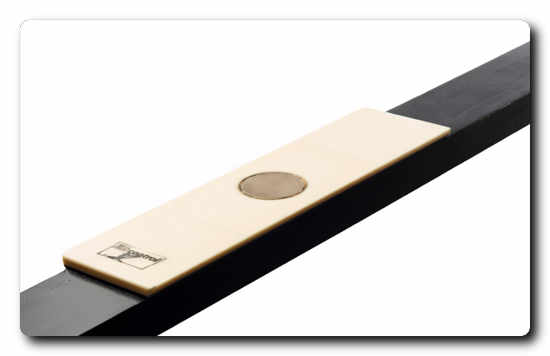 Continuous measurement of water removal with IQ Dryness provides energy savings with vacuum optimization, quicker startups, faster grade changes, fewer breaks and improved break recovery.
Continuous measurement of water removal with IQ Dryness provides energy savings with vacuum optimization, quicker startups, faster grade changes, fewer breaks and improved break recovery.
All grades and furnishes
Unlike other measurement technologies, Valmet IQ Dryness is not sensitive to conductivity which makes it suitable for use with all grades of paper and board. As well as energy savings with vacuum optimization; quicker startups, faster grade changes, fewer breaks and improved break recovery are just a few of the benefits that continuous measurement of water removal makes possible.
Optimized dewatering not only improves bonding for multilayer board machines but can also reduce the problems of blow induced breaks caused by excess moisture in the middle layer entering the drying section. Additionally, the measurement facilitates the online monitoring fabric condition together with improved troubleshooting of pulsation, vibration and other quality destroying wet end problems. The sensor's small size enables measurement in places inaccessible earlier.
Complete moisture management
This new sensor joins the Valmet IQ family of single point and scanning measurements to provide papermakers with a complete picture of MD and CD moisture from the forming and press sections, dryer and size press right up to the reel. Together with sophisticated moisture controls and an extensive range of actuators to control moisture levels and profiles, Valmet can close the loop to offer improved efficiency and runnability as well as better paper quality and printing properties.
International Paper And World Wildlife Fund Collaborate To Develop Science-Based Targets For Forests And Advance Forest Restoration In Brazil
How much forest land—and what quality—is needed to ensure forests can continue to provide people, plants and animals worldwide with clean air and water, food and the goods and services they need to thrive?
![]() Through a new collaboration between World Wildlife Fund (WWF) and International Paper (NYSE: IP), research will be undertaken to help answer the question of the quantity and quality of forestland needed for the planet to thrive. The outputs of this work will be used to help create the world's first regional and global science-based targets for forests, as well as the first comprehensive set of guidance on actions that can be taken to sustain the world's forests. Such 'forest positive' actions include investing in responsible forest management, supporting forest conservation, restoring forestland, and raising awareness about the importance of forests with consumers.
Through a new collaboration between World Wildlife Fund (WWF) and International Paper (NYSE: IP), research will be undertaken to help answer the question of the quantity and quality of forestland needed for the planet to thrive. The outputs of this work will be used to help create the world's first regional and global science-based targets for forests, as well as the first comprehensive set of guidance on actions that can be taken to sustain the world's forests. Such 'forest positive' actions include investing in responsible forest management, supporting forest conservation, restoring forestland, and raising awareness about the importance of forests with consumers.
"Our entire business depends on the sustainability of forests," said Sophie Beckham, IP Senior Manager of Natural Capital Stewardship. "We are excited to build on our participation in WWF's Global Forest & Trade Network program through a significant and strategic initiative to advance conservation and restoration actions in forest ecosystems beyond our existing fiber supply chains."
In addition to delivering on the UN Sustainable Development Goals at the global level, the collaboration also will bring one local action to life—investing in a new ambitious restoration project in the Mogi Guaçu river basin of the Atlantic Forest of Brazil. IP has operations and is already investing in restoration in this region, work that will ideally inspire other organizations to invest in forest restoration in Brazil and beyond.
"IP's investment and leadership will drive and deliver a better understanding of what forests need to stay well above their ecological tipping points," said Kerry Cesareo, vice president for forests at World Wildlife Fund. "Given the large scale and fast pace of forest loss and degradation globally, bold and inspiring actions like this within the private sector are needed to sustain forests."
Through this expanded collaboration, IP demonstrates that investing in the long-term sustainability of natural capital makes economic sense. As a company that transforms renewable resources into fiber-based products that people depend on every day, IP will continue to promote responsible forest stewardship, both within and beyond its supply chains, to ensure healthy and productive forest ecosystems for generations to come.
Toscotec to supply a dryer section rebuild to Papertech PM1 in Tudela Mill, Spain
Toscotec was selected to rebuild the dryer section of Papertech PM 1 at Tudela mill, Spain. The customer has recognized Toscotec is the right partner to provide the best technology available in the drying process and to accomplish the company targets.
The ambitious aim of the project is to improve the actual gross production, by overcoming several constraints by intelligently applying Toscotec’s Steel Dryer technology and its features. The base project goals were: increasing the production, by maintaining the same length of dryer section, and drying a wider paper sheet with the same dryer face length.
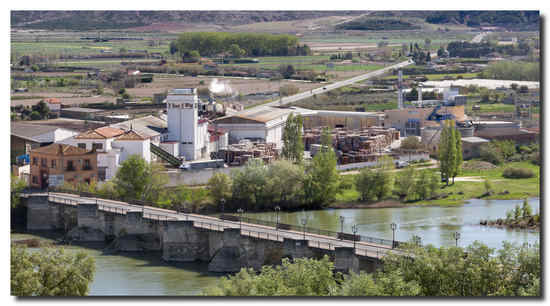
The scope of supply will be on a turnkey basis, confirming once more the consolidated skill of Toscotec to manage complex projects and coordinate all the involved parties.
With this achievement, Toscotec will strengthen its reputation for being an all-round partner for Paper and Board manufacturers.
A key factor of the dryer section modification is to replace completely the last four sections with TT SteelDryer technology, thus resulting in 20 new TT SteelDryers with increased diameter and drying face width. The scope of supply also includes TT AirTail, an advanced rope-less tail threading system, specifically designed for low speed and high basis weight.
Toscotec’s service specialists will provide erection, supervision, commissioning and start-up assistance.
Delivery is forecast within the end of 2018, with start-up at beginning of 2019.
ANDRITZ acquires Novimpianti, Italy
International technology Group ANDRITZ has signed a contract for the acquisition of Novimpianti Drying Technology S.r.l., a company owned by Novigroup S.r.l. and based in Lucca, Italy. Novimpianti has approximately 40 employees and generates annual sales of approximately 10 million euros.
 Novimpianti is a global supplier of engineered equipment and services for air and energy systems to the paper industry’s leading manufacturers. For ANDRITZ, the acquisition of Novimpianti further strengthens its product offerings in the field of air and energy systems, mainly for tissue and paperboard machines. “We are very excited about this complementary acquisition that extends the ANDRITZ market coverage and product range in Tissue and Paper,” says Michael Pichler, SVP and ANDRITZ Global Paper and Tissue Division Manager.
Novimpianti is a global supplier of engineered equipment and services for air and energy systems to the paper industry’s leading manufacturers. For ANDRITZ, the acquisition of Novimpianti further strengthens its product offerings in the field of air and energy systems, mainly for tissue and paperboard machines. “We are very excited about this complementary acquisition that extends the ANDRITZ market coverage and product range in Tissue and Paper,” says Michael Pichler, SVP and ANDRITZ Global Paper and Tissue Division Manager.
Novimpianti’s CEO, Pietro Saccomano, comments: “The ambitions of ANDRITZ to further grow in the tissue and paper business and their international position were decisive for the decision to hand over our company and know-how to them. The sale of Novimpianti will grant ANDRITZ continuous growth in the area of air and energy systems based on the solid foundation we have built during the past decades.”
Companies Breaking Promises Over Pulp and Paper Use; Deforestation, Climate Emissions and Human Rights Abuses Still Problematic
New report finds some –– like Scholastic –– are leading the pack, while others fall behind, despite commitments to clean up corporate supply chains
Office Depot, Penguin Random House and Japanese office supply giant Askul are among the companies called out for not living up to corporate promises in a new report released by Rainforest Action Network (RAN).
The pulp and paper industry is a significant driver of deforestation and climate emissions globally, and many major end-users of pulp and paper products have adopted corporate policies to cut out deforestation and human rights abuses in their supply chain. Still, RAN’s new report finds that, despite these promises, in many cases conditions on the ground show little change.

“Around the world, communities have lost and continue to lose their lands and forests to existing plantations and plantation expansion. Basic human rights are not being respected, intact forests are being felled, and carbon-rich peatlands are still burning,” said Brihannala Morgan, Senior Campaigner with Rainforest Action Network (RAN). “Companies are not meeting their promises, and the world’s forests and forest-dependent communities are suffering the consequences.”
RAN found that, while several companies are taking active steps to ensure that their policies are creating real change on the ground, many companies are moving slowly in turning their policy promises into real change on the ground.
Companies like Scholastic, LBrands, Macmillan and Hachette are leading the pack, while pulp and paper giants like Askul, Office Depot, and Penguin Random House need to take urgent action to show the marketplace that they are serious about their commitments. RAN used company surveys and reports to benchmark 13 key companies across several pulp and paper consumer sectors that have developed policies on pulp and paper sourcing.
Indonesia’s forests––with their globally significant biodiversity, importance for the climate, and consequence to local and Indigenous communities––have long been a focal point for global advocacy campaigns. Indonesia’s high deforestation rate, significant greenhouse gas emissions and human rights abuses are largely driven by the nation’s massive plantation sectors, including industrial pulpwood plantations.
ABB team honored by TAPPI with prestigious Jasper Mardon award at PaperCon 2018
Prominent ABB scientist Dr. Shih-Chin Chen and cross-generational team are recognized for Best Papermaking Technology Paper presented at PaperCon Conference
ABB announced that global pulp & paper trade organization TAPPI recently honored a team of ABB experts, Dr. Shih-Chin Chen, Ake Hellstrom and ChangYuan Liu, with the Jasper Mardon Memorial Prize for the Best Papermaking Technology Paper presented at PaperCon. The annual award is the highest honor for a technical paper at the event. The ABB team collaborated on the winning paper, entitled “Best Practices for Maintaining QCS Scanning Systems at Pristine Conditions.”
TAPPI CEO, Mr. Larry Montague presented the award at PaperCon 2018 in Charlotte, NC in April. It recognizes the paper from the previous year’s conference that “best advances the science of papermaking.”
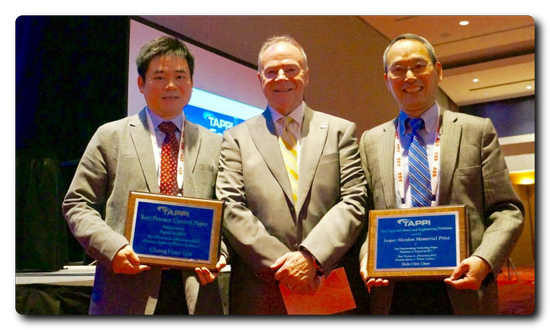 Left to right: ChangYuan Liu (ABB), Larry Montague (TAPPI), Dr. Shih-Chin Chen (ABB)
Left to right: ChangYuan Liu (ABB), Larry Montague (TAPPI), Dr. Shih-Chin Chen (ABB)
“We are very proud of our team and their dedication to improving the process of papermaking for the industry, “said Jim Fisher, Local Business Manager, Process Industries in US for ABB. “They have devoted their careers to discovering and developing methods and technologies to improve the papermaking process. This paper is a great example of sharing best practices for the greater good of the industry. We are honored that their work has been recognized by TAPPI.”
The paper was authored by Dr. Chen, Ake Hellstrom and ChangYuan Liu, a multi-generational team of experts in the process of papermaking. Dr. Chen is Corporate Executive Engineer with ABB’s Pulp & Paper business, and has been with the company for 34 years. Ake Hellstrom, Principal Engineer for scanners and sensors, retired from ABB in 2009 after 40 years of services for ABB, and still collaborates with colleagues at ABB on ideas and practical solutions. ChangYuan Liu joined ABB in 2013; since then he has worked with Dr. Chen and other technology development and service teams as Regional Technology Advisor (RTA). The authors drew upon their collective experience to write the winning paper.
The paper discussed how online quality measurement and control systems (QCS) are critical equipment that papermakers need to achieve intended sheet qualities and to optimize production throughput for most sheet-making processes. The most crucial mechanical systems within the QCS are the scanners that carry various sheet quality measurement sensors; these traverse across running sheets continuously during production. Long lifespan, high reliability, and consistent accuracy in harsh environments are all critical for these scanners. The paper examined the potential issues faced with QCS scanners and introduces new measurement and analysis methods to evaluate the conditions of scanning systems, and the best practices to keep QCS scanners operating in the most pristine condition possible.
Awarded each year by TAPPI, The Jasper Mardon Prize honors the memory of legendary industry scientist and author Dr. Jasper Mardon. During his 50-year career, Mardon made many significant contributions to paper making technology in areas including machine design, operation optimization, training and education and research management.
Formed in 1915, TAPPI (Technical Association of the Pulp and Paper Industry) has around 14,000 member engineers, managers, scientists, academics, suppliers and others from around the world. The trade organization serves professionals working in the global pulp and paper industry and related fields.
PMP to supply (2) Intelli-Tissue® EcoEc 1600 Premium tissue machines for Baoding Yusen Health Supplies Co. Ltd
On 29th March 2018, PMP (Paper Machinery Producer) signed a contract with Baoding Yusen Health Supplies for the delivery of (2) Intelli-Tissue® EcoEc 1600 Premium lines.
 The (2) Intelli-Tissue® EcoEc 1600 Premium will be characterized with 3500mm reel trim, operating speed of 1600 m/min, daily capacity 75 t/d and a basis weight 12.5-31 gsm each. This project will be based on a PMP Integrated Tissue Mill concept, which means 2 machines (left-hand and right-hand) in the same building, a shared control room as well as a warehouse. The same model of right and left hand machines layout in one building is the most compact solution and the two machines can share a common spare parts base. As a result, both space and costs are saved as well as number of personnel required to run the installations. At the same time high production flexibility plays a significant role in achieving top installations effectiveness.
The (2) Intelli-Tissue® EcoEc 1600 Premium will be characterized with 3500mm reel trim, operating speed of 1600 m/min, daily capacity 75 t/d and a basis weight 12.5-31 gsm each. This project will be based on a PMP Integrated Tissue Mill concept, which means 2 machines (left-hand and right-hand) in the same building, a shared control room as well as a warehouse. The same model of right and left hand machines layout in one building is the most compact solution and the two machines can share a common spare parts base. As a result, both space and costs are saved as well as number of personnel required to run the installations. At the same time high production flexibility plays a significant role in achieving top installations effectiveness.
The PMP’s scope of supply will cover for each machine: the single layer Intelli-Jet V® hydraulic Headbox, 4-roll Intelli-Former® Crescent Former, Intelli-Press® equipped with Intelli-SPR® dia 1400 mm which will maximize the amount of water removed from the sheet, 16ft Steel Intelli-YD®, Intelli-Hood® (YD cap type) and Intelli-Reel®. In addition, PMP will provide mechanical drives, electrical drives, lubrication system, steam & condensate system, dust & mist removal systems (on machine parts only), DCS and control system. The PMP team will also provide erection supervision and technological start-up.
The new project will be implemented based on the Optimum Cost Solution philosophy by executing the tissue machine fully designed in Europe (PMPoland), manufacturing of the key components such as a hydraulic headbox and a steel Yankee in Europe, and the remaining manufacturing, as well as tissue machine pre-assembly and tests completed at the PMP Center of Excellence: PMP IB, Changzhou (China). This combination allows to lower a cost of investment for the customer, while maintaining the premium quality of the equipment supplied. Both machines will start-up by the end of 2019.
With the excellent performance of operating reference and continuous new orders, PMP Intelli-Tissue® EcoEc Technology has been recognized worldwide to be a high-quality, high-efficient and ultra-low consumption solution for tissuemakers.
Year by year, PMP increases its presence in China through implementation of projects for both tissue & paper customers. Only in the last decade in Mainland China, PMP provided 16 CF tissue machines and 28 capital machine rebuilds both in tissue and paper side, including core technological units such as Intelli-Jet V® Headboxes, Intelli-Nip® Shoe Presses, Intelli-Sizer® Size Presses, etc. Combination of a state-of-art technology and rich experience of PMP and convenient local service from PMP IB results in smart integration of assets & competences. This way PMP Intelli-Tissue® tissue solutions bring excellent support for its users daily.
About Baoding Yusen Health:
Baoding Yusen Health - a manufacturer specialized in the production and processing of domestic paper. It's located in Mancheng Daceying Papermaking Industial Zone, Baoding, China. After years of efforts, the company has established a modern enterprise system and has developed into a backbone manufacturing enterprise of domestic paper with an annual output value of 1.5 billion yuan and an annual production of 150,000 tons. The company focuses on product quality, and strictly implements the national industry standards, being innovative in succession and making development in innovation. Yusen Paper keeps challenging itself in the fierce market competition, perform its industry charm, creating well-known brands like Kangrou, Yusen and Baili as well as more than 80 single domestic paper products. All products are made of imported natural wood pulp, which is clean, white, soft, delicate, hygienic, super flexible, absorbent, easy to break, and easy to degrade. (learn more: www.yusenpaper.com)
